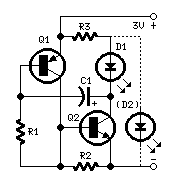Minimum parts counting
Designed for 3V battery operation
R2,R3 47R 1/4W Resistors
C1 10µF 25V Electrolytic Capacitor
D1,(D2 LED(s) (Any type and color)
Q1 BC560 45V 100mA PNP Transistor
Q2 BC337 45V 800mA NPN Transistor
Add D2 to obtain two LED alternate blinking.
D1's on-time is shorter than off-time. The opposite regarding D2.
You can also use D2 only, shorting D1.
Don't change resistors' values.
Flashing frequency can be varied changing C1 value from 2.2µF to 100µF and higher.
This circuit is very efficient when driving a 3.2V lamp. In this case omit the LEDs and R3, connecting the lamp at Q2's collector and to positive supply, further reducing parts counting.
Designed for 3V battery operation
Circuit diagram:
Parts:
R1 33K 1/4W ResistorR2,R3 47R 1/4W Resistors
C1 10µF 25V Electrolytic Capacitor
D1,(D2 LED(s) (Any type and color)
Q1 BC560 45V 100mA PNP Transistor
Q2 BC337 45V 800mA NPN Transistor
Notes:
Power supply can vary from 2 to 4.5V.Add D2 to obtain two LED alternate blinking.
D1's on-time is shorter than off-time. The opposite regarding D2.
You can also use D2 only, shorting D1.
Don't change resistors' values.
Flashing frequency can be varied changing C1 value from 2.2µF to 100µF and higher.
This circuit is very efficient when driving a 3.2V lamp. In this case omit the LEDs and R3, connecting the lamp at Q2's collector and to positive supply, further reducing parts counting.







No comments:
Post a Comment